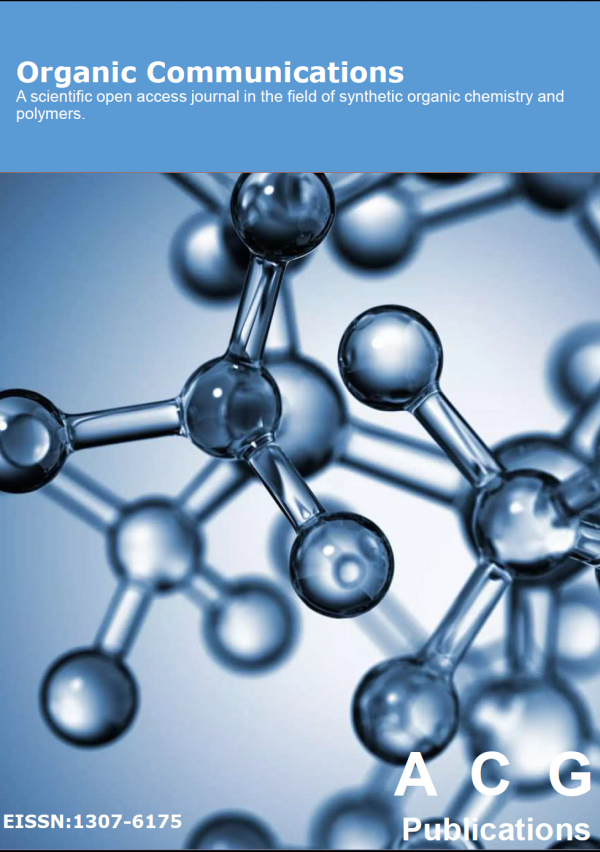Organic Communications
Year: 2013 Volume: 6 Issue:4 October-December
1) Development of one pot three component synthesis of 1,4-substituted, 1,2,3-triazoles, employing green catalyst
An efficient and eco-friendly protocol for the synthesis of 1,4-substituted-1H-1,2,3-triazoles was achieved employing D-glucosamine as a green ligand with CuI as catalyst. An advantage, of high water solubility, of the ligand facilitates easy catalyst removal. All the products were formed in good yields and were characterized by advanced spectral data.
Keywords D-glucosamine 1 4-substituted-1H-1 2 3-triazoles CuI aryl halides eco-friendly DETAILS PDF OF ARTICLE © 2013 ACG Publications. All rights reserved.2) Concise synthesis of a novel antifungal agent 4-methoxydecanoic acid
4-Methoxy decanoic acid is belongs to a fatty acid family and has a novel anti- fungal activity. The aliphatic molecule has been synthesized in seven steps with an overall yield 41%. The synthesis was started from a commercially available epichloro hydrin and all the reactions were very clean.
Keywords Epichlorohydrin Grignard reaction methyliodide oxidation hydrolysis DETAILS PDF OF ARTICLE © 2013 ACG Publications. All rights reserved.3) Synthesis and antifungal evaluation of imines derived from 3-Amino-2-isopropyl-3H-quinazolin-4-one
Novel Schiff bases were synthesised using 3-aminoquinazolinone (1) and a variety of aldehydes in the presence of acetic acid as solvent. Antifungal evaluation of the compounds was carried out by the agar dilution method. Among the all compounds prepared, quinazolinone itself showed the best fungiostatic activity against all filamentous fungi.
Keywords Quinazolinone schiff bases Imines antifungal antimicrobial DETAILS PDF OF ARTICLE © 2013 ACG Publications. All rights reserved.4) Synthesis of new biologically active triazolo, tetrazolo and coumarinoyl derivatives of isocoumarins
With the aim of developing potential antimicrobial agents, a series of triazolo / tetrazolo isoquinolines incorporating both nitrogen and oxygen as part of the hetero aromatic ring were prepared from 4-alkyl-3-aroyl isocoumarins via a number of intermediate steps. Some novel coumarinoyl derivatives of isocoumarins were also synthesized starting from 4-alkyl-3-aroyl isocoumarin and characterized by FTIR, 1H NMR, Mass Spectroscopy and elemental analysis. All the title compounds 7a,b, 8a,b, 10a-g were evaluated for their antibacterial activity
against S. Aureus (as gram positive), E. Coli (gram negative bacteria) and antifungal activity against Fusarium pallidoroseum & Chaetonium in vitro and analgesic activity which was tested in vivo on mice. Most of the compounds showed appreciable results for all the three activities. The relationship between the functional group variation and biological activity of the evaluated compound is discussed. The new compounds emerged as potential molecule for further development.
